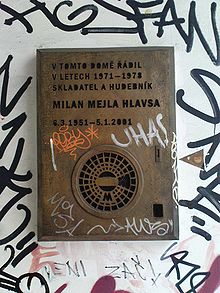- Milan Hlavsa
-
Metal box at the entrance to the house in Ječná street in Prague, where Hlavsa had lived for most of his life and where all the important people of the "underground" culture had been meeting. If you insert a 10 crown coin into the slot, the biggest hit song of Milan Hlavsa, Muchomůrky bílé, will start playing.

Milan "Mejla" Hlavsa (Prague, March 6, 1951 - January 5, 2001) was the founder, chief songwriter, and original bassist of the Czech band Plastic People of the Universe, which was part of the inspiration for the anti-establishment movement Charter 77.
Contents
Early life and musical exposure
Milan Hlavsa was born on March 6, 1951 in Prague, Czechoslovakia.[1] While his father was employed as a bank clerk, Milan himself labored as a butcher's apprentice before he founded the Plastic People of the Universe (PPU) in 1968.[2] Due to oppression by Czechoslovakia's communist regime, access to Western music was limited, to say the least. While stores were not able to retail albums by Western bands, native Czechs maintained a link to the Western music world by obtaining these albums from friends and family that lived abroad. It is from listening to these banned albums that a young Milan developed an affinity for American rock and roll.[3] In the 1960s, long-haired Hlavsa became a sympathizer of the movement called máničky.
The formation of the Plastic People
In 1967, a friend of Hlavsa's introduced him to the music of the Velvet Underground. At the time, Milan was in a band known as the Primitives Group. Along with the music of Frank Zappa, the Underground would prove to be a large influence upon the music of the PPU. In 1968, Hlavsa abandoned the Primitives Group and joined with Michal Jernek, Jiří Števich and Josef Brabec to form the Plastic People. [1]
Social impact
In 1970, two short years after the Plastic People of the Universe were formed, the government stripped them of their professional license. Without this, they were unable to play legally. To circumvent the system, the members of the PPU took jobs working in the forest, and played unofficially with minor police intervention until 1976. That year, the PPU were members of a festival that promoted "druhá kultura", or second culture. The communist regime, finding this opposed to their ideals, arrested and tried the members of the PPU.[2] Three members were jailed, and a former member (Canadian Paul Wilson) was deported. Hlavsa, the founding member, was the only one who escaped without a sentence.
It was the arrest and trial of the PPU that would convince Václav Havel, along with others, to take action against the communist government. Their efforts would culminate in the organization Charter 77, which aimed to persuade the government to follow the UN Declaration of Human Rights and the Helsinki Accords, both of which the government had signed. This organization would be one of the most prominent dissident societies to arise in Czechoslovakia in opposition to the communist government.[4]
Following their release from prison, the PPU would continue to perform discretely until the government permitted them to play publicly in 1988.[2]
Hiatus, Půlnoc, and reuniting the Plastic People
In 1988, the Czechoslovakian government allowed the PPU to perform publicly, after 18 years of being banned, but soon a disagreement arose between band members. The band split up. Hlavsa formed a new group called Půlnoc (which is the Czech word for "Midnight"). The band included PPU keyboardist Josef Janicek and violist Jiri Kabes. Půlnoc released City of Hysteria in the United States on Arista Records in 1991. In 1997, after 9 years of separation, at Havel's suggestion, Hlavsa reunited with the other Plastic People and performed a series of concerts to mark the 20 anniversary of Charter 77, the Czech Human rights document,they began to perform again. In 1999, along with Lou Reed, the Plastic People of the Universe performed at the White House.[2]
Death
On January 5, 2001, Hlavsa succumbed to lung cancer and died. The Plastic People of the Universe continue to play[2] with Eva Turnová who sang and played bass with PPU sister band DG 307 and in Silenstvi, a short-lived band Hlavsa put together to record his first solo album, also called Silenstvi, playing bass. Silenstvi, which means madness in Czech, was released by Globus Music in 1999.
References
- ^ http://www.britannica.com/eb/article-9351408/Hlavsa,%20Milan
- ^ a b c d e http://www.robertchristgau.com/xg/music/hlavsa-rs.php
- ^ http://www.richieunterberger.com/hlavsa.html
- ^ Stokes, Gale. The Walls Came Tumbling Down. New York: Oxford University Press, 1993.
Vratislav Brabenec | Josef Janíček | Jiří Kabeš | Josef Karafiát | Eva Turnová | Jaroslav Kvasnička
Milan Hlavsa | Michal Jernek | Jiří Števich | Pavel Zeman | Paul Wilson | Jan Jílek | Jiří Šula | Jaroslav Vožniak | Jan Brabec | Ladislav Leština | Petr Placák | Ivan Bierhanzl | Ludvík Kandl | Milan Schelinger | Jan MacháčekStudio albums Egon Bondy's Happy Hearts Club Banned | Pašijové hry velikonoční | Jak bude po smrti | Co znamená vésti koně | Kolejnice duní | Hovězí porážka | Půlnoční myš | Líně s tebou spím / Lazy Love | Maska za maskouLive albums Muž bez uší | Do lesíčka na čekanou | Vožralej jak slíva | Ach to státu hanobení | Trouble every day | Bez ohňů je underground | The Plastic People Of The Universe | Pašijové hry | Obešel já polí pětAssociated acts Categories:- 1951 births
- 2001 deaths
- Czech musicians
- Bass guitarists
- The Plastic People of the Universe members
Wikimedia Foundation. 2010.

